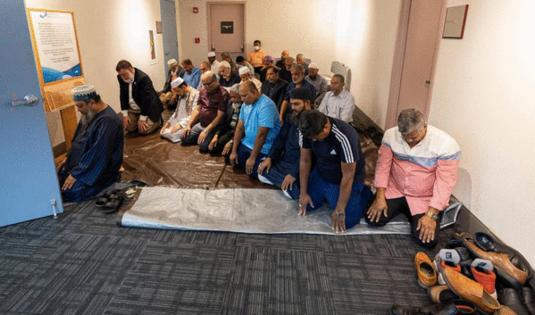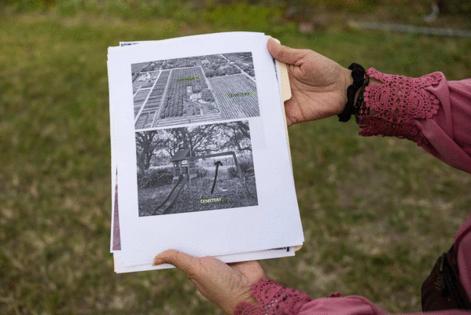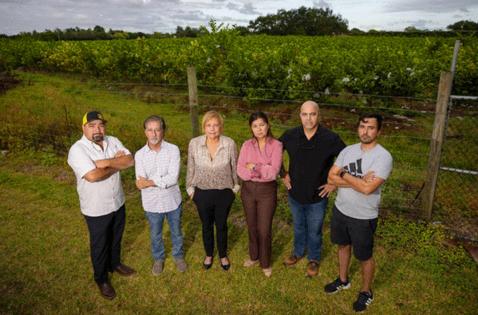Group seeks a new Muslim cemetery in Miami-Dade. Neighbors oppose the rezoning
Published in News & Features
MIAMI — Citing a growing Muslim population in South Florida, an Islamic Center wants to open a cemetery that adheres to the religion’s specific burial rites on a seven-acre plot in the Redland.
“As this community expands, so does the need for a burial space. This is the fact of life,” said Dr. Tariq Chebbi, a well-known South Florida Imam at a zoning hearing earlier this month on the proposal. “Proper burial in accordance with Islamic teaching is very important. This involves specific ritual and practices that must be followed.”
Islam — a religion that has a strong belief in the afterlife — places great importance on burials. Muslims believe in burying their loved ones as soon as possible after death. Plots must be facing East, toward Mecca, the Islamic holy city. Muslims don’t use embalming chemicals and cremation is forbidden. Ideally, they are supposed to be buried alongside other Muslims.
“Burial is a religious practice for Muslims and that’s why it’s so important,” said Omar Saleh, legal director of the Council of American-Islamic Relations (CAIR), an organization also advocating for the project’s approval. “That’s the distinction made between other funeral homes ... Most Muslims have run into those issues of not only how to bury, but how quickly to bury.”
But some neighbors in southwest Miami-Dade are fighting the rezoning request — not because of the religion involved, they insist, but because they don’t want a graveyard of any kind in a rural area of small farms, nurseries and homes.
“We just don’t want a cemetery. It can be a Catholic cemetery, it can be any type ... we just don’t want a cemetery,” said Alexei Enriquez, who owns property directly across from the proposed space. “It’s something that will be devastating for the whole community.”
The proposal already has been the main subject of two Community Zoning Appeals Board meetings this month but it hasn’t been voted on by the board. That’s just a first step. Ultimately, Miami-Dade County commissioners have final approval of the rezoning decision.
The issue has packed both meetings. At the first, over 100 people — mostly Muslim men, women and families — showed up to speak in support of the proposed cemetery. More than 50 people were signed up to protest the item but never got a chance because the meeting ran too long.
Earlier this week, speakers packed a small meeting room at South Dade regional library in Cutler Bay for another meeting, but a decision was deferred after one of the board members failed to attend, leaving the board without a quorum.
Foes of the cemetery have a list of concerns — declining property values, environmental issues and increased traffic, among them — and have hired a lawyer, David Winker, to help fight the proposal.
“This cemetery is not compatible with the surrounding homes,” said Winker. “Putting a cemetery here is disruptive to the nature of this area, and to the character of the surrounding area.”
Matthew Rendini, who has owned a home next to the proposed plot of land for 25 years, said he’s concerned about how the cemetery could impact home values as well as the psychological impact on the nearby residents.
“This doesn’t fit. We’re not happy about it,” said Rendini. “We all know that death is a fact of life, but I don’t want to be reminded every time I come in and out of my house.”
Zoning disputes are often divisive but cemetery supporters have suggested that discrimination could be driving resistance to the project.
Saleh, the CAIR legal director and a Broward resident, told zoning board members that developing property for a religious use is a protected right, but that mosques are historically opposed more often than other houses of worship.
“If you look historically about the challenges based on land use, it’s almost always because of a mosque, not any other place of worship,” Saleh said at the first zoning meeting. “We’re more than 20 years after 9/11, a lot of people just don’t know about Muslims,” he said. “We’re here to alleviate any of these concerns.”
The allegations of prejudice were dismissed by residents. The Islamic center, called Masjid ul Mumineem, already exists just two miles away from the proposed land. It’s just the expansion to a cemetery they say they oppose.
“They tried to frame this as something against the Muslim community, and it is not,” Enriquez said. “It has nothing to do with that. We are all, especially in this city, we’re all immigrants.”
‘Sacred obligation in our religion’
The proposal to build the cemetery was submitted over a year ago by the leaders of Masjid ul Mumineem, which has owned the lot at the corner of Southwest 256th Street and Soutwest 152nd Avenue, since 2016. It currently holds a grove of guava trees and is surrounded by homeowners and small farms.
In the proposal, Mohammad Bhuiyam, a board director of the mosque, along with two other members of the Muslim community, Islam Mozaharul and Latifur Raham, wrote that the cemetery location would provide a “serene and peaceful environment” for funeral ceremonies, memorial services and other religious events, as well as promote a “shared identity within the community.”
It also states that those involved with planning and building the cemetery “are willing and ready to mitigate any potential conflicts or concerns” though the residents opposing the proposal say no one from the mosque has reached out to discuss or mitigate their concerns.
Perhaps the biggest case for the cemetery, which is supported by the greater Muslim community in South Florida, is a growing need for space dedicated to the religion’s specific practices. Since Islamic tradition requires a prompt burial within 24 hours of the death, supporters say the shortage makes a difficult time for families even harder.
“Muslims face difficulty in finding a convenient burial site,” said Imam Chebbi at the hearing. “They are now forced to travel to the cemetery that was approved by the county in the northern part of the county, which is really far for the people in South Dade, therefore creating additional emotional stress during a time of grief.”
For example, when Lynda Raheem lost her 34-year-old Muslim daughter to cancer in 2011, locating a cemetery that followed proper Islamic burial practices was difficult.
“Finding a Muslim cemetery was a daunting experience,” said Raheem, the former assistant dean at the College of Business at Florida International University and a longtime Miami-Dade resident. Raheem’s daughter, who was a public school teacher, wife and mother of two, was undergoing a bone marrow transplant in Tampa when she died.
“Getting her body from Tampa, Florida, to Miami, finding a funeral home that knew just a little bit about the religion of Islam, what Muslims are required to do when they have a deceased member, was difficult,” she said at a zoning meeting earlier this month.
Battle over burial ground
There are an estimated 150,000-200,000 Muslims in the South Florida area, according to the South Florida Muslim Federation. There are several cemeteries, including one in Sunrise and one in Opa-locka, that have sections where Muslims are buried.
But there is only one cemetery, the Muslim Cemetery of South Florida, operated by a nonprofit called the Bism Rabbik Foundation, that is operated by and specifically for Muslims. That cemetery has the capacity for around 8,000 graves, and currently has around 1,300 occupied, according to a spokesperson for the Bism Rabbik Foundation.
The Bism Rabbik Foundation said that although their plots are not nearly full, they do get clients traveling from as far as Key West or Naples who use their burial services, and that having another option for the community would be ideal.
Labib Ahmed, 26, whose uncle is on the board of Masjid Ul Mumineen, said that the proposed project is “not just about convenience.”
“For many of us, this project is more than just a practical need. It represents a sacred obligation in our religion, Islam, caring for the deceased and providing a proper burial in accordance with our faith is one of the most important responsibilities we bear,” Ahmed said in an interview with the Miami Herald.
Ahmed, who is a youth chairman of the Muslim Communities Association in Miami Gardens, said he hopes at the next meeting, the groups will be able to discuss and work out the residents’ concerns.
Opponents believe the shortage of space is exaggerated.
“They do have plenty of options,” said Redland resident Enriquez. “They can bury in a regular cemetery where they have space for the religion, plus they have a private cemetery.”
Enriquez said he’s gathered at least 30 signatures from residents opposing the project, including one woman, Margarita Valencia, who just three months ago bought a home with a backyard overlooking the plot of land, giving her a magnified view of the guava trees that soon might become gravesites.
“If you want to do something like this, you go to a place where no neighbor or community is gonna get disturbed,” said Enriquez. “But it’s a cemetery, it’s not a church, it’s not a learning center. It’s a cemetery.”
One Islamic burial practice has been a focal point for opponents. Muslims don’t use caskets to bury the deceased. Instead, the body is cleansed, shrouded, prayed over, and then buried. This is part of the reason why a fast burial is vital for those who follow Islam. There is no coffin or sealed cement burial vault as are commonly used in many other cemeteries.
Redland residents, who use well water as drinking water, wonder about what that might mean for nearby homes. Neither side has produced any studies or reports on that issue.
“We don’t have city water. So this is a big concern of what’s going to leach down into the water table and get into the aquifer.” said Rendini. “The water that we use to bathe, to run our house, to wash our clothes ...What’s going to happen with that?”
Ahmed and other Muslims argued their burial methods are actually more environmentally responsible than other methods.
“Traditional burials, they often involve the use of chemicals,” Ahmed said,. “And Muslim burial practices, we favor simple, chemical-free methods that promote natural decomposition. As the body breaks down, it enriches the soil with organic matter.”
This story was produced with financial support from Trish and Dan Bell and from donors comprising the South Florida Jewish and Muslim Communities, in partnership with Journalism Funding Partners. The Miami Herald maintains full editorial control of this work.
©2024 Miami Herald. Visit at miamiherald.com. Distributed by Tribune Content Agency, LLC.












Comments